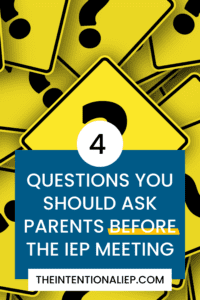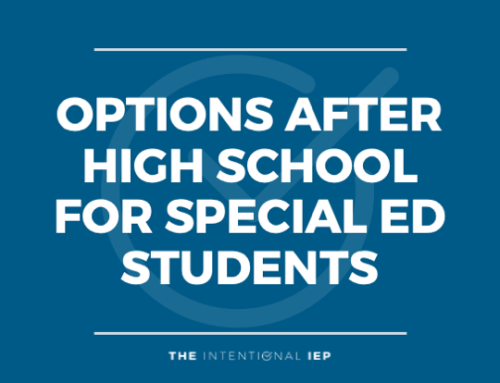Preparing for an IEP meeting requires the juggling of a lot of different components. From paperwork and writing the actual IEP to communicating and documenting interactions with families and teachers, there is a lot to get done.
One of the most important pieces to ensuring that the meeting will run smoothly though is to make sure that you have asked the right questions of parents and given them the information they need.
But what types of questions should you ask parents prior to an IEP meeting? We have some ideas below.
Questions to Ask Parents Before an IEP Meeting
What Are Your Child’s Strengths?
Parents know their children best and it is important to find out what they see as their child’s strengths. Asking this question allows them to give input and provide a perspective on the child that you may not see as the special ed teacher. It is also a time for parents to brag about their child a bit – something that they may not get to do a lot.
What Concerns Do You Have?
Remember that the parents are part of the IEP team and their concerns need to be addressed just as much as those of any other team member. By asking what their concerns are ahead of time, you will have a better understanding of where they are coming from and what you need to focus on in the meeting.
Always keep in mind that parental concerns come from a place of love and worry. They are trusting a system with their child and they are scared. Don’t dismiss their concerns, but, instead, validate their feelings and address them both with compassion and professionalism.
Check out this short snippet from one of the trainings inside of TII membership about involving parents in the IEP:
If you are looking for more specifics on IEP’s like writing IEP goals and behavior plans – you’re in the right place!
By joining the membership, individuals also gain access to an extensive library of over 13,000 pre-written IEP goals, empowering them with a wealth of options to support their students’ unique needs.
Learn more and become a member of The Intentional IEP today!
What Other Information Do You Think Would Be Helpful for the Team to Know?
Parents may have other information about their child that will help the IEP team when making placement decisions or setting goals. If family or life circumstances have changed (or will be changing) those things can disrupt a child’s life and cause issues in the classroom. Divorces, deaths in the family, the loss of pets, moves, and more can all impact a child’s behavior and frame of mind – which may, in turn, impact their IEP goal progress.
When meeting with parents before an IEP meeting, keep notes. You don’t want to forget to ask anything, and you definitely don’t want to forget what the parents say when it comes to their child. Use these conference letter and summary resources when you join The Intentional IEP here or by clicking the image above.
What Can I Clarify for You Prior to the Meeting?

Still not sure what questions to ask parents before going into an IEP meeting? Get the IEP Toolkit! It has everything you need to hold an organized, professional IEP meeting – including a list of questions to ask parents prior to an IEP meeting! With everything set up and organized for you, you will shave hours off of your IEP meeting prep time! Learn more about the IEP Toolkit here!
Starting the conversation with families about the child and the IEP prior to the official IEP meeting can help alleviate fears and worries and create a sense of peace. When families know that you are invested in their child’s well-being and success too, they are much more willing to work together with the school. You are the first link in the chain of partnership.
Read Previous Post | Back to the Blog | Read Next Post






